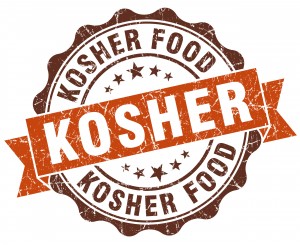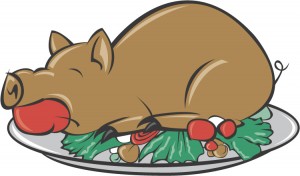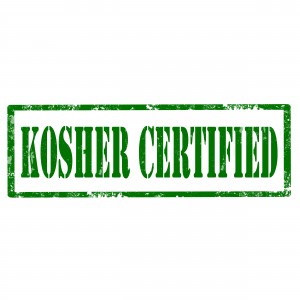Why are the biblical dietary laws still relevant today followers of Yeshua (Jesus)? As this video shows, it is primarily a godlines and holiness issue, and only secondarily a health issue. When giving his people the laws of clean and unclean meats, Elohim was wanting them to be holy as he is holy, and he still wants a holy people who live an unpolluted lifestyle today.
Tag Archives: Kosher
Videos: The Bible on Clean and Unclean Meats
This video presents the heart and spirit behind the biblical dietary commandments. A free study guide is available at http://hoshanarabbah.org/pdfs/food_for_thought.pdf.
In this video, Natan discusses controversial passages in the New Testament that many Bible teachers use to invalidate the Old Testament dietary laws, and he shows how their arguments are illogically invalid.
The Heart & Spirit Behind the Biblical Dietary Law
The Genesis creation account records that YHVH Elohim made man in his own image (Gen. 1:26). As such, the first humans, Adam and Eve, had spiritual communion with their Creator. Though man fell quickly to the temptation to sin, which separated him from a sinless, set-apart and righteous Creator, YHVH has desired to redeem man from the power of sin to be set-apart (kadosh) as he is set-apart (e.g. Lev 11:44).
Israel was redeemed from YHVH’s judgment against sin when they sacrificed the lamb on Passover and painted the blood on the door posts of their homes. YHVH then immersed Israel in the Red Sea (a picture of baptism for the remission of sins) and led them to the foot of Mount Sinai. YHVH revealed his Torah-truth (his instructions, teachings and precepts in righteousness) to the nation of Israel from Mount Sinai so that they could become a set-apart (kadosh) kingdom of priests (Exod. 19:6). He was showing them the pathway of righteousness so that after having been redeemed by the blood of the lamb—a direct prophetic picture pointing to Yeshua the Lamb of YHVH slain from the foundation of the world—they could have fellowship with him by avoiding sinning by walking in the straight and narrow path of righteousness.
Part of the walking in a loving relationship with a righteous and totally set-apart (kadosh) YHVH involves keeping his commandments as Yeshua said in John 14:15. To know and to love YHVH is to obey his commandments (1 John 2:3-6). Those who love him and back up their belief in him with the actions of obedience (faith without works is dead, Jas. 2:14-26) are better off than the demons who believe in Elohim only, but do not back up their belief with obedience to YHVH’s righteous commands. Those who love and obey YHVH Continue reading
“Common and Unclean” Explained
Romans 14:14, Nothing is unclean in itself. In this verse, is the Apostle Paul declaring that there is no longer a distinction between clean and unclean foods, therefore making void the biblical dietary laws? Let’s analyze the contextual and linguistic aspects of this passage to see what Paul is really saying here.
The word unclean (koinos) in this verse can also mean “common,” and in three places in the Apostolic Scriptures the two words “common” and “unclean” are used side by side; q.v. Acts 10: 14, 28 and 11:8, which says, “But I said, Not so, Master: for nothing common [koinos] or unclean [akathartos] has at any time entered into my mouth. “From this example, we see that unclean in Romans 14 can also mean “common” as we find in Acts 11. The word for unclean in Acts 11:8 is an entirely different word; therefore, akathartos is a reference to unclean meat, as proscribed by the Torah. Koinos, on the other hand, cannot mean unclean meat in Romans 14, or else Acts 11:8 would be a superfluous and unexplainably redundant in using two words that mean exactly the same thing. The word koinos is used elsewhere in the Apostolic Scriptures not to mean “unclean,” as in “unclean meat,” but “unclean” as in unwashed hands (Mark 7:2), or “common,” as in something that is shared commonly among people (Acts 2:44; 4:32; Tit 1:4; Jude 3). Of the seven places this word is used in the Apostolic Scriptures it never means unclean meat.
In David Stern’s Jewish New Testament Commentary, on Romans 14 he states that Paul is not abrogating the biblical dietary laws. On verse 14, Stern states that Paul is referring to ritual purity, not whether something is unclean (nonkosher) meat or not. What is ritual purity? It is a reference to either how something was slaughtered, and whether it was bled properly, or whether the meat had previously been sacrificed to idols before being sold in the public meat markets—a common practice in that day in pagan cities.
Furthermore, Paul could not have been advocating eating swine, and other unclean meats, without making himself into a total hypocrite and liar, since in several places in the Book of Acts he strongly states (toward the end of his life) that he was a Torah-observant Jew and walked orderly and kept the Torah (Acts 21:20), and that he had not broken any of the Torah laws (Acts 25:16), which would have included the dietary laws contained in the Torah.
Let’s also keep an important point in mind when speaking of YHVH’s biblical dietary commands: When someone gets born again or regenerated spiritually their digestive system does not change. Eating unclean or biblically unkosher meat is, from a purely medical standpoint, deleterious to one’s health regardless of whether one is a believer in Yeshua or not.
Is YOUR belly your god, or is Elohim your God?
Leviticus 11:1–47, Let’s briefly discuss the subject of clean and unclean meats. The focal point of biblical dietary laws are holiness and separation. There are other issues here that need to be explored as well. How serious are you about obedience to YHVH’s commands, or is your belly your god? (See Phil 3:19; Rom 16:18.) Do your taste buds or the Word of YHVH rule your life? Remember, Torah covers all aspects of life: physical, spiritual, emotional, relational, civil, agricultural, political, jurisprudence, religious, and economic. Torah is a very holistic handbook on life. Are you one who takes the (humanistic) pick-and-choose approach to Torah-obedience? “I’ll obey only the biblical laws that suit me.” Such an approach is akin to what the serpent told Adam and Eve when he said, “You can have it your way … YHVH didn’t really mean what he said when it comes to obedience.”
The biblical kosher laws involve many areas such as health issues, holiness (not defiling the body, the temple of YHVH’s Set-Apart Spirit), and separation issues— how we’re to act, live, eat, worship, think, dress and talk differently than the heathens around us. The word kosher derives from the Hebrew word kasher/RAF (Strong’s H3787) meaning “to be straight, right, acceptable” (see Est 8:5; Eccl 11:6; 10:10). YHVH has called his people out of this world and sanctified (set-apart) them to be “straight, right and acceptable” to him. Therefore, YHVH hasn’t give us the liberty to act, speak, dress, eat and live the way the heathens do. He has called us to a higher standard. We can’t expect to be called the children of the Most High, and still live like the children of the world. We must choose whom we are going to serve (see Josh 24:15): YHVH or mammon and this world (Matt 6:24).
Leviticus 11:4, 47, Unclean. The word unclean is the Hebrew word tameh meaning “defiled, impure, polluted ethically, ritually or religiously” and the word clean is the Hebrew word tahor meaning “pure physically, ceremonially, morally, ethically.” In verse 43, YHVH says that in eating unclean meats one becomes abominable (or detestable, filthy). In Ezekiel 22:26, YHVH rebukes his people because, “Her priests have violated my Torah-law, and have profaned my set-apart (Heb. kadosh) things: they have put no difference between the set-apart and profane, polluted or common, neither have they shown difference between the unclean and the clean, and have hid their eyes from my sabbaths, and I am profaned among them.” In Leviticus 11:45, the Torah states, “For I am YHVH that brought you up out of the land of Egypt, to be your Elohim. You shall therefore be set apart, for I am set apart/holy.”
In 2 Corinthians 6:16–17, we read:
And what agreement does the temple of Elohim have with idols? For you are the temple of the living Elohim; as Elohim has said, “I will dwell in them, and walk in them; and I will be their Elohim, and they shall be my people. Wherefore come out from among them, and be you separate,” says the Master, “and touch not the unclean thing; and I will receive you.” (emphasis added)
The issue of clean or pure and unclean, polluted or abominable meats is not simply a dietary or health consideration, but a spiritual issue with YHVH. Both Moses (Lev 19:2) and the apostolic writers had a clear sense of the fact that without holiness no one will see YHVH (Heb 12:14), and that holiness or being kadosh or set-apart from the ways, lifestyles, ideologies of this world (i.e., from spiritual Egypt) is an absolute requirement of YHVH for his people. Is it possible to spiritualize away the concept of set-apartness and still be true to the Word of Elohim? Can one be spiritually sanctified (set-apart) through the atoning work of Yeshua at the cross, but then have a polluted lifestyle? Can one profess a righteous lifestyle and be set-apart without walking out that lifestyle? Can one follow the spirit of the law and violate the letter and still be acceptable to YHVH? What did James say about faith without works (Jas 2:20)? What did Yeshua teach at the Sermon on the Mount (Matt 5–7) about uniting the letter and the spirit of the law and practicing both? (Specifically read Matt 5:21–48 for the answer.)
Leviticus 11:10, 20, 23, 41, 42, Abomination. Heb. sheqets (Strong’s H8263) meaning “a detestable thing or idol.” It can also mean “to make abominable” or “contaminate.” This word is also used in connection with idolatrous practices, either referring to the idols themselves as being abhorrent and detestable in Elohim’s sight, or to something associated with the idolatrous ritual (TWOT, pp. 954–955; e.g. Jer 16:18; Ezek 5:11; 7:20; 2 Chron 15:8). Not only are the idols an abomination, but those who worship them become detestable as well (Hos 9:10). In fact, the word abomination in “abomination of desolation” as mentioned in Daniel 9:27 and 12:11 is the same Hebrew word. It is generally viewed that this prophecy was fulfilled when Antiochus Ephiphanes (a prophetic foreshadow of the Antichrist) set up an idol of Zeus in the Jerusalem temple (Ibid.). It should be clear that when YHVH uses sheqets (or its cognates) in relationship to certain practices (e.g., eating unclean meats or idol worship) that he is attempting to impress upon his people the extreme gravity of the sins they are committing against him.
Eating a biblically kosher diet isn’t as hard as you think
The other day, someone commented on this blog about the difficulty of eating a kosher diet without having a Jewish kosher food store nearby. I want to discuss this issue a bit and dispel this notion.
First off, there are two types of “kosher.” They are rabbinic kosher, and biblical kosher. One who doesn’t know better would probably think these two are the same, but they’re not. The biblical standards for clean and unclean meats (or eating kosher) are very minimal and are found primarily in Leviticus chapter eleven of the Torah (the first five books of the Bible). There we learn what animal meat is clean (and permissible to eat), and what meat is unclean (and not permissible to eat). Elsewhere in the Torah, we learn that YHVH’s also forbids his people from eating blood (Gen 9:4; 17:12, 14; Deut 12:23), organ fat (Lev 3:17; 7:23), and animals that die of themselves (e.g., because of disease or old age) or that have been killed by other animals ( Exod 22:31; Lev 7:24; 17:15; 22:8; Deut 14:21). Basically, these are the biblical dietary standards regarding clean and unclean meats.
What types of animals does the Bible permit us to eat? Simply stated, only land animals that have cloven hooves and chews their cud, only fish that have fins and scales, only fowl-type birds, and only insects that are in the grasshopper or locust family are permitted for human consumption
Some might wonder about the Jewish rabbinic tradition of not eating meat and dairy. This is based on the Torah-law that forbids the eating a kid (or young goat) that has been boiled in its mother’s milk (Exod 23:19; 34:26; Deut 14:21). This law has been understood to refer to any young kosher animal in addition to goats. The problem with this passage is that it has several possible interpretations. They are as follows:
- It’s unlawful to eat a kid that hasn’t been weaned.
- It’s unlawful to boil meat in milk from its mother.
- It’s unlawful to eat any milk and meat products together.
The rabbinic Jews have primarily taken the third explanation for their interpretation of this law. However, this is a faulty interpretation in light of the fact that Abraham fed the three heavenly messenger (one of whom was YHVH — or the preincarnate Yeshua the Messiah) meat and dairy together (Gen 18:6-8). It’s highly improbable that Abraham who was Continue reading
Spiritually, are you a pig or a lamb?
Are you holy or profane? The Bible teaches that what we eat reflects who we are spiritually.
Leviticus 11:1–47, Let’s briefly discuss the subject of clean and unclean meats. There are many issues here that need to be explored. How serious are you about obedience? Is your belly your god? (See Phil 3:19; Rom 16:18.) Do your taste buds or the Word of YHVH rule your life? Remember, Torah covers all aspects of life: physical, spiritual, emotional, relational, civil, agricultural, political, jurisprudence, religious, and economic. Torah is a very holistic handbook on life. Are you one who takes the (humanistic) pick-and-choose approach to Torah-obedience? “I’ll obey only the biblical laws that suit me.” Such an approach is akin to what the serpent told Adam and Eve when he said, “You can have it your way … YHVH didn’t really mean what he said when it comes to obedience.”
The biblical kosher laws involve many areas such as health issues, holiness (not defiling the body, the temple of YHVH’s Set-Apart Spirit), and separation issues— how we’re to act, live, eat, worship, think, dress and talk differently than the heathens around us. The word kosher derives from the Hebrew word kasher (Strong’s H3787) meaning “to be straight, right, acceptable” (see Est 8:5; Eccl 11:6; 10:10). YHVH has called his people out of this world and sanctified (set-apart) them to be “straight, right and acceptable” to him. Therefore, YHVH hasn’t give us the liberty to act, speak, dress, eat and live the way the heathens do. He’s called us to a higher standard. We can’t expect to be called the children of the Most High, yet live like the children of the world. We must choose whom we are going to serve (see Josh 24:15): YHVH or mammon and this world (Matt 6:24).
Leviticus 11:4, 47, Unclean. The word unclean is the Hebrew word tameh meaning “defiled, impure, polluted ethically, ritually or religiously” and the word clean is the Hebrew Continue reading






